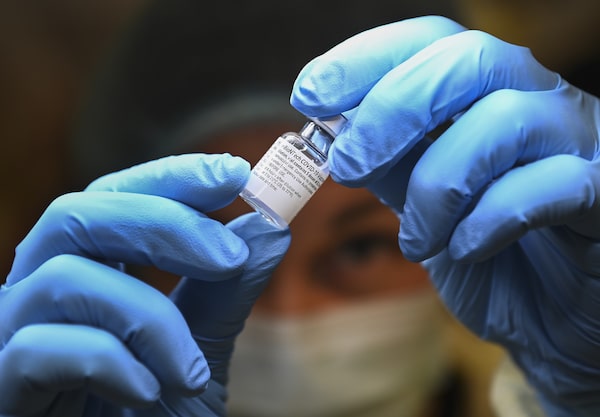
A health-care worker prepares a dose of the Pfizer-BioNTech COVID-19 vaccine at a UHN COVID-19 vaccine clinic in Toronto on Jan. 7, 2021.Nathan Denette/The Canadian Press
Pharmacy chains say they are ready and willing to help get COVID-19 vaccines into people’s arms, and could ramp up in as little as 48 to 72 hours if necessary.
But retailers are awaiting more details from governments on their role, saying more preparation time and clear guidance would make the rollout go more smoothly.
“The biggest concern would be having the vaccine available, and turning to pharmacies and saying, ‘Let’s do this,’ and then realizing that we have a lot of details that we haven’t quite ironed out,” said Sandra Hanna, chief executive officer of the Neighbourhood Pharmacy Association of Canada, an industry group representing 11,000 pharmacies across the country.
Most provinces have plans to include pharmacies, but many details are still in the works, posing a challenge for the quick turnaround with Canada expected to scale up vaccinations in the next two months.
In a survey, the association’s members indicated they could administer as many as three million COVID-19 vaccines per week in total, once the supply is available.
“We’ve done mass vaccination programs already with flu. There’s a tried-and-true method to do high volume,” said Shoppers Drug Mart president Jeff Leger.
Flu campaigns have helped prepare pharmacies – including this season, when appointment-booking systems were needed to avoid crowding at drugstores amid high demand for that vaccine.
But in the case of COVID-19 vaccines, prescreening will be necessary to determine people’s eligibility to receive a shot. Because prioritization will differ from province to province, Empire Cos. Ltd. – which owns the Lawtons drugstore chain in Atlantic Canada and pharmacies in grocery stores across Canada including Sobeys and Safeway – is tweaking its appointment-scheduling tool to tell people whether it is time for them to book, based on factors such as age and where they live.
Pharmacies will also need guidance from provinces on what to do if they find themselves with extra doses at any given time.
“Let’s be clear on how we’re going to use them, to make sure that we waste none of them and that we are administering them to the most appropriate patients or customers,” said Marie-Claude Vézina, vice-president and general manager for pharmacy at Empire. “That’s very important. And that’s something that still needs some clarity.”
Data collection is another challenge. Pharmacies already communicate with the provinces – scanning health cards and entering billing codes when they administer a flu shot, for example. But some provinces are building additional systems to manage the COVID-19 vaccination effort. Integrating that technology with the pharmacies’ existing systems will be a process.
“All these operational considerations need to be taken into account before you hit the switch,” said Justin Bates, CEO of the Ontario Pharmacists Association, which is hoping there will be a dry run to get any early hiccups out of the way. “As much as we’re ready to go, and can turn that switch quickly, it would be good to understand how that system is going to work.”
While data entry may seem like a small thing, it can have big consequences. In California, the Los Angeles Times has reported that problems with data collection have affected the speed at which doses are sent out to various locations – and a coding error led to underreporting of the number of doses used.
Communication with the public is also going to be crucial.
“There’s some confusion on when and how vaccines are going to be distributed,” Ms. Vézina said. “If I am an 80-year-old grandmother, will someone call me? Do I have to call someone? That is the kind of information that I would say is lacking ... from all provinces.”
Pharmacies see it as part of their role to provide information to the public, and to address vaccine hesitancy. Rexall has been working on updating its website with more information about the COVID-19 vaccines.
“Even our cashier should be able to answer with a certain level of information – they’re not going to be giving health advice certainly, but they can point to the right resources,” said Mona Sabharwal, Rexall’s senior vice-president of pharmacy services.
Ontario and Saskatchewan have both signalled that pharmacies could begin vaccinations as early as April. On Monday, Manitoba issued an announcement inviting pharmacies to fill out applications to administer COVID-19 vaccines. In other cases, such registrations have not yet begun.
In the meantime, pharmacies have been working with staff to ensure that their injection training and vaccine certifications are up to date. Some have also been investing in equipment. Empire has purchased 115 new refrigerators for its pharmacies, and Shoppers Drug Mart has invested in added refrigerator and freezer capacity at its distribution centres. London Drugs bought a number of ultra-cold freezers – at roughly $20,000 each – that can handle the storage requirements for the Pfizer vaccine.
“We made enough of an investment to make sure we can cover certain areas,” said Chris Chiew, general manager of pharmacy for London Drugs. “... It was extremely expensive, and we made the investment to show the government that we are ready to help.”
Our Morning Update and Evening Update newsletters are written by Globe editors, giving you a concise summary of the day’s most important headlines. Sign up today.
 Susan Krashinsky Robertson
Susan Krashinsky Robertson